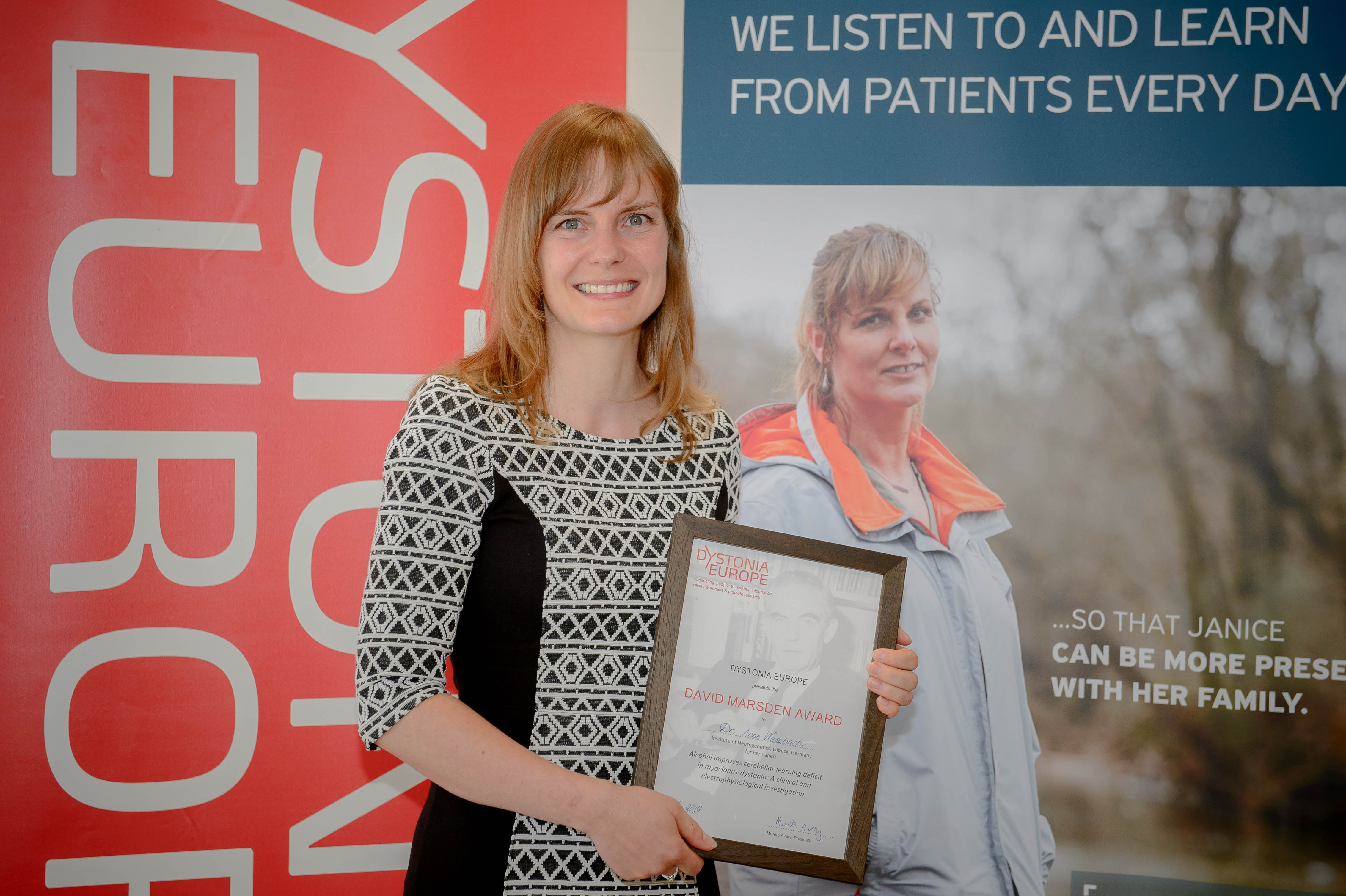
Our congratulations to Dr. Anne Weissbach, Institute of Neurogenetics in Lübeck, Germany, and the David Marsden Award 2019 for her paper: “Alcohol improves cerebellar learning deficit in myoclonus-dystonia: A clinical and electrophysiological investigation”.
Dr. Weissbach was presented with the award by Dystonia Europe President Merete Avery at the Dystonia-Days 2019 held in London last weekend. Dr Weissbach expressed her thanks to DE and Ipsen for the award and then presented the work of her research.
About the winner
Dr. Weissbach is a neurologist and a clinician-scientist at the Institute of Neurogenetics in Lübeck of Prof. Christine Klein. She studied Medicine at the University of Lübeck and finished her residency in Neurology at the Clinic of Neurology at the University Clinic Schleswig-Holstein. During her scientific education, she was trained in transcranial magnetic stimulation and blink reflex conditioning at the research laboratory of Prof. Robert Chen and Prof. Anthony Lang in Toronto, Canada and the Neuroscience Section of Prof. Münchau and Prof. Bäumer at the Institute of Neurogenetics in Lübeck, Germany.
Dr. Weissbach has a particular interest in the neurophysiological characteristics of monogenic forms of dystonia, that can serve as a model disease for currently genetically undefined (idiopathic) forms.
About the research
Currently, the pathophysiology of dystonia is still largely unknown, thereby impeding the development of causal treatment options. In recent years, growing evidence has emerged, pointing towards the concept of dystonia as a network disorder and emphasizing the specific importance of subcortical nodes, including the cerebellum in the pathogenesis of a subgroup of dystonias. The lack of a clear understanding of the defective subcortical neural basis of dystonia and its possible modulation is, at least partly, explained by a paucity of neuropathologically delineated disease mechanisms. However, for myoclonus-dystonia (M-D) due to mutations in the epsilon-sacoglycan(SGCE) gene several important clues have emerged: At the molecular level, SGCE is highly expressed in gamma-aminobutyric acid (GABA)-ergic synapses of the cerebellum and additionally structural, functional and metabolic studies suggested cerebellar abnormalities in these patients.
Interestingly, the majority of patients report a remarkable decrease of motor symptoms after intake of alcohol, which acts as an indirect GABA agonist.
We therefore investigated 17 SGCE-positive M-D patients, who suffer from childhood-onset, often debilitating generalized myoclonic jerks and segmental dystonia and 21 matched healthy control subjects. We used classical eyeblink conditioning, a form of cerebellar-associative motor learning, that has been proven to involve the cerebellar interposed nucleus and cerebellar cortex and blink reflex recovery cycle, representing pontine/medulla oblongata-basal ganglia circuits. All measurements were carried out before and after alcohol intake, including extensive clinical video-based investigations with results being evaluated by three blinded movement disorder specialists.
In contrast to healthy controls, M-D patients showed significantly reduced eyeblink conditioning at baseline that was normalized by the intake of alcohol. Of note, alcohol also significantly reduced motor symptoms in these patients. Blink reflex recovery was normal at both time points.
Through our work we were able to establish an in vivomodel for a cerebellar deficit in dystonia, in which mutations in the SGCEgene cause a GABAergic deficit due to Purkinje cell dysfunction resulting in a disinhibition of classical eyeblink conditioning pathways that were temporarily compensated for by acute GABAergic substitution by alcohol intake. The combination of our findings suggests a crucial role of cerebellar networks in the generation of symptoms in these patients and will serve as a model opening up new avenues for the development of novel pathophysiological concepts and treatment strategies in dystonia.
